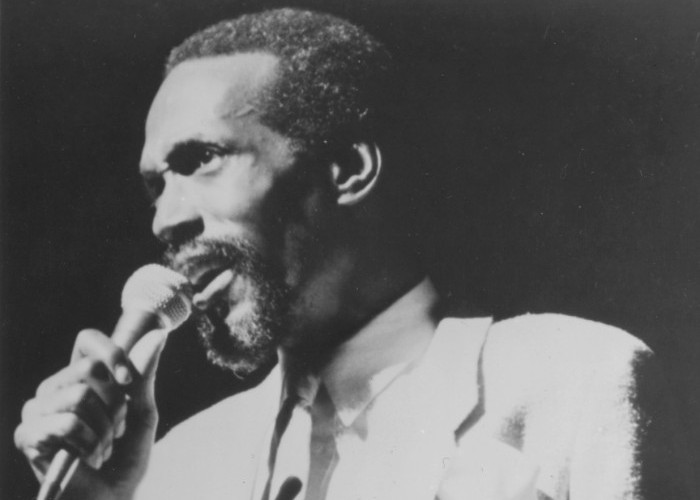Jan 13, 2026 2:09 PM
More Trump-Kennedy Center Cancellations
The fallout from the renaming of the John F. Kennedy Center for the Performing Arts to include President Donald…

Eddie Kendricks (1939–1992)
(Photo: DownBeat Archive)By 1972, Eddie Kendricks, the Temptations singer who led the ensemble through classics like “Just My Imagination,” was ready for a new sound.
The vocalist’s first solo effort, 1971’s aptly titled All By Myself, still hued toward classic Motown, so when Kendricks was set to record its follow-up, People ... Hold On, he enlisted a new raft of players to back him.
The Young Senators toured extensively with Kendricks during his early solo performances, despite not having played on his 1971 disc. The Washington D.C. ensemble’s contributions to People, though, would help move the singer into a new stage of his career. It also marked a change for Motown Records (and its affiliate labels, Gordy and Tamla), the company Kendricks had released music through for more than a decade.
People was issued on Tamla in late spring 1972, about a year after Marvin Gaye’s opus, What’s Going On. And while Kendricks’ album wasn’t as sizeable a hit as Gaye’s, People managed to spawn a major single, the 7-minute workout “Girl You Need A Change Of Mind.”
“We took Motown away from the Motown Sound,” Young Senators percussionist Jimi Dougans, 74, said recently about the pivotal 1972 Kendricks album. “If you listen to any Motown records, they had a certain rhythm, a certain groove. ... They locked into that, and that’s the Motown Sound. Even the producer [of People], Frank Wilson, said, ‘We wanted to get away from that.’”
At the time, The Young Senators only had issued a 7-inch single. But Dougans’ chops noticeably propel “My People ... Hold On,” a statement-making cut laden with avant-echo and phasing famously sampled by hip-hop producer J Dilla on his 2005 album Donuts. Even with the song’s liberal use of effects, the percussionist noted, “It’s a subtle, a very subtle sound ... . We all were on one accord. That made it nice and sweet.”
In the wake of the 1967 riots, Detroit was a murkier place than it had been back in 1959, when Motown was born. And perhaps because of the unrest, the label finalized its move from Detroit to Los Angeles in 1972. Members of the imprint’s venerable Funk Brothers session band got pink slips, and Marlene Barrow-Tate—a member of The Andantes, a band that sang backup on recordings by The Four Tops, The Supremes and countless other acts—told the Detroit Metro Times in 2013 that the singers picked up their final paychecks in January 1972. It was the same month that People ... Hold On was recorded. The album also was one of the last Motown works recorded at the label’s famed Studio A.
“They brought us to Detroit ... West Grand Boulevard. Down in the basement—we called it the Snake Pit,” Dougans said about the studio from where dozens of hits emerged. “It was a ton of snow outside, knee-high. Wasn’t nobody on the streets; we were the only ones.”
But the energy in the studio was high.
“One session, ‘Girl You Need A Change Of Mind,’ was at three o’clock in the morning, when everybody’s supposed to be asleep,” Dougans continued. “We were up. The engineer was up. Producers were up. Eddie was up recording.”
Motown had enjoyed stratospheric success, finding an uncanny ability to cross over. But People—accented with a heavy swing—seemed less pop-oriented. If Motown had been The Sound of Young America, this music was the sound of the streets, and the title was no accident. People was one for the people, not for Middle America. Tracks like “If You Let Me” and “Eddie’s Love” showcased slinky two-step rhythms and horn charts steeped in an urban sound that never were intended to appeal to every demographic in America.
While The Young Senators didn’t record on Kendricks’ later albums, the group would go on to become a fixture of Washington’s vibrant and percussive go-go music scene. Kendricks (1939–’92) broke through as a solo artist with hits like “Keep On Truckin” and “Goin’ Up In Smoke” later in the decade. And People ... Hold On remains an exciting testament to Kendricks’ experimentation with a younger band.
“We put our foot in it, man, and that’s what it was,” exclaimed Dougans, who remains active today. “We would put all our essence [into the recording]. We used to pray before we played ... . What we prayed for is what we got.” DB
Ayana Contreras hosts Reclaimed Soul on WBEZ and Vocalo Radio in Chicago.

Belá Fleck during an interview with Fredrika Whitfield on CNN.
Jan 13, 2026 2:09 PM
The fallout from the renaming of the John F. Kennedy Center for the Performing Arts to include President Donald…

Peplowski first came to prominence in legacy swing bands, including the final iteration of the Benny Goodman Orchestra, before beginning a solo career in the late 1980s.
Feb 3, 2026 12:10 AM
Ken Peplowski, a clarinetist and tenor saxophonist who straddled the worlds of traditional and modern jazz, died Feb. 2…

The success of Oregon’s first album, 1971’s Music Of Another Present Era, allowed Towner to establish a solo career.
Jan 19, 2026 5:02 PM
Ralph Towner, a guitarist and composer who blended multiple genres, including jazz — and throughout them all remained…

Rico’s Anti-Microbial Instrument Swab
Jan 19, 2026 2:48 PM
With this year’s NAMM Show right around the corner, we can look forward to plenty of new and innovative instruments…

Richie Beirach was particularly renowned for his approach to chromatic harmony, which he used to improvise reharmonizations of originals and standards.
Jan 27, 2026 11:19 AM
Richie Beirach, a pianist and composer who channeled a knowledge of modern classical music into his jazz practice,…